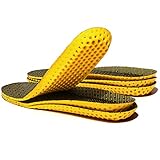Hiking boots, can we really do without them when exploring our wild side on the hills or mountains? Perhaps not!
However, for one reason or another, your hiking boots may begin to stink really bad making it uncomfortable for you and those around you.
Should you throw away your hiking boots at this point? Definitely not! There are ways you can prevent this ugly occurrence.
Contents
Why do My Hiking Boots Stink?
Hiking boots often soak up sweat and moisture and tend to harbor more molds and bacteria than the average running shoes.
These microorganisms build up in the boots and enter into anaerobic respiration as the moisture content of the boots increases. During anaerobic respiration, the microorganisms produce sulfur compounds with a rotten egg smell.
Hiking boots are not cheap. Besides making your boot more comfortable, preventing hiking boots from stinking will also enhance their lifespan.
The steps to prevent hiking boots from stinking are not as hard as they may sound. However, before talking about prevention it is important to understand why hiking boots smell in the first place.
Below are some of the reasons why hiking boots get smelly and the ways you can prevent it.

1. Sweaty feet
There are about 125,000 sweat glands on each foot (totaling about 250,000 for both feet). The soles of your feet contain more sweat glands per square centimeter compared to the rest of the body.
That means your feet are bound to get sweaty especially when you hike mountains or hot terrains like the Smoky Mountains and Joshua Tree National Park—and there is little you can do to stop your feet from sweating.
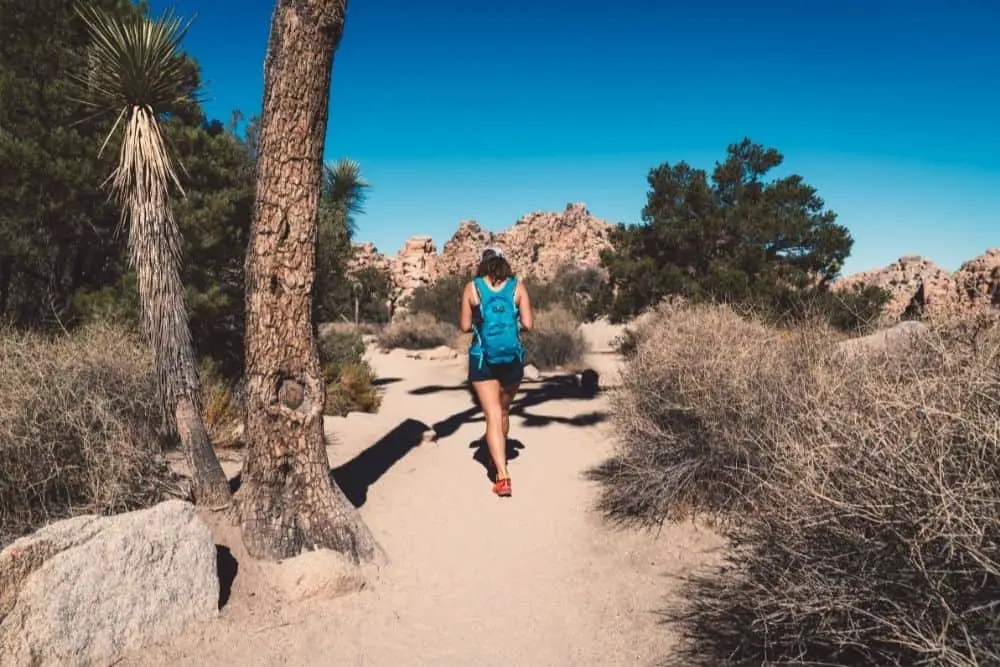
To keep your feet dry, hiking boots are often made of materials that soak up the sweat and stench from your feet. Eventually, while your feet get drier, the hiking boots will become wetter. A hot humid environment helps smell-causing bacteria and fungi to thrive.
Since it will be hard to stop your feet from sweating when you hike for long hours, the alternative to preventing your boots from stinking would be finding ways to get rid of the bacterial and fungal buildup.
How to prevent smelly boots caused by sweaty feet
The best way to prevent boots from smelling as a result of sweaty feet is by cleaning them after use. For this, you will need a special boot brush and a toothbrush as well as a mild soapy solution and water.
Make sure the soapy solution of your choice can be used on the boot. This information should be provided in the instructions.
Use the brush and the soapy solution to scrub the body of the outer and inner soles of the boots. Use a towel or a soft cloth to clean the inner part of the footwear to get rid of the sweat and let it dry in a cool area safe from direct sun rays.
Never try to dry your boots by keeping them close to a heat source such as a wood stove, fireplace, heater, radiator, etc. High heat leads to the premature aging of leather and the weakening of adhesives.
Alternatively, stuff the boots with newspapers, boot trees or dryer sheets to help pull moisture from the boots and change the newspaper of dryer sheets when they become damp. Do this after every extended use.
Last update on 2023-11-11 / Affiliate links / Images from Amazon Product Advertising API
Another way to curb hiking boot stinks caused by sweaty feet is to wear wool or cotton socks before wearing them. Avoid nylon socks because they will exacerbate the situation.
Also, make sure you pack extra socks so that you can change into another pair of socks once the one you are wearing becomes damp.
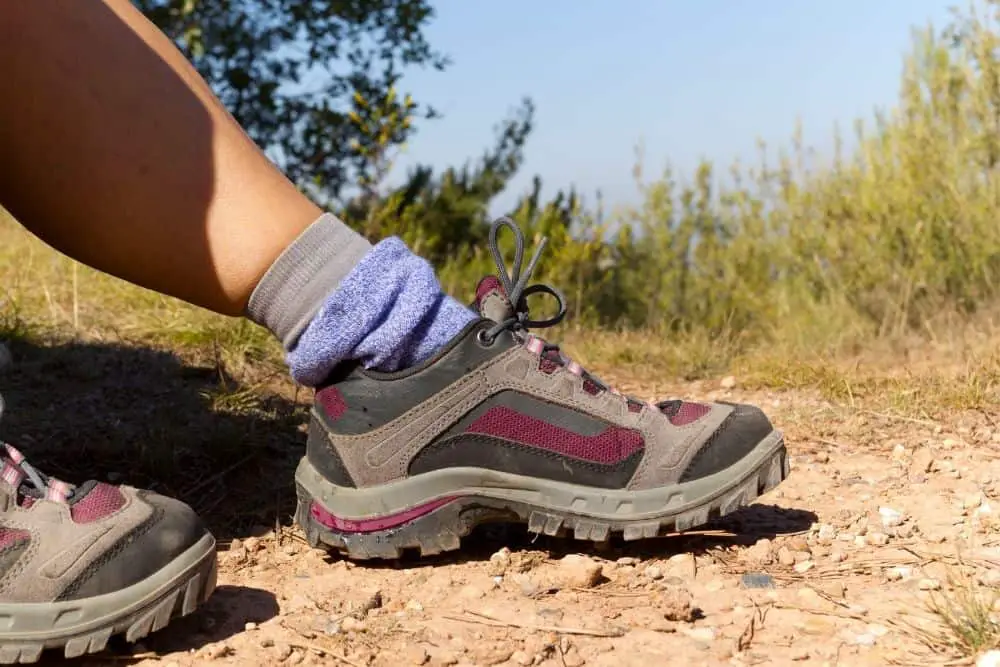
2. Growth of Bacteria or Fungi
Bacterial and fungal growth can still happen on the inside of the boots even without wearing them. This happens if you store your boots in a place with high humidity.
Boots made of leather will begin to absorb moisture and create a breeding ground for bacteria and fungi.

How to prevent the growth of fungi and bacteria
Preventing fungal and bacterial buildup in your hiking boot when it is not in use has to do with proper storage.
When storing your hiking boots over a long period, it is a smart idea to remove the insoles from the boots and let them air-dry separately.
Keep them in areas with low humidity. Where possible, keep the boots in a place where a fan blows on them regularly. Make sure that the temperature of the place you intend to store your boots is fairly stable.
If you are keeping your boots for a long time in a humid environment, tossing silica gel bags into each of them can help keep them dry. Hanging the boot is also a great idea to improve drying and prevent absorbing moisture from the environment.
Personally, I use a boot rack to keep my boots in shape and often use a boot dryer in the rainy season or winter to keep them dry.
Last update on 2023-11-10 / Affiliate links / Images from Amazon Product Advertising API
3. Hiking wet terrains or hiking in winter or spring
While early summer is usually the best time for hiking, some prefer to have their hikes in spring. At such times it is almost impossible to prevent your boots from getting wet due to rains.
There are also wet hikes that present stunning features. Some good examples of wet hikes are Solstice Canyon, Malibu, Santa Monica Mountains, and Escondido Canyon Park and Falls, Malibu.
No matter how hard you try, the odds are always high that you will get your boots wet in such locations.
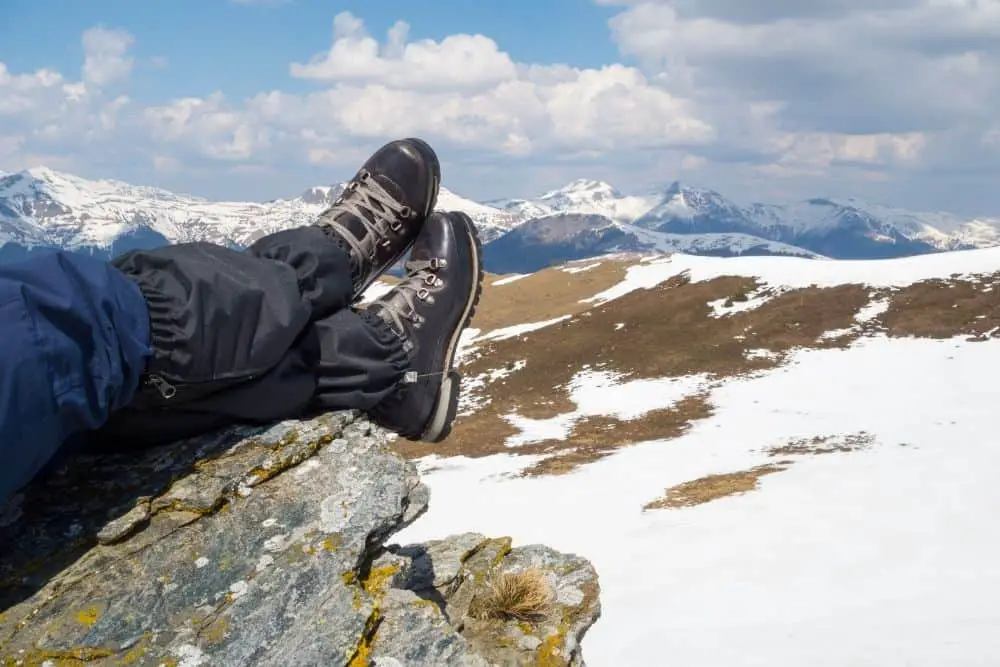
How to prevent stinking boots after wet hikes
The faster your boots dry after getting wet, the less likely it would smell. Like mentioned earlier, drying your boots at a hot temperature is a bad idea. Place them in front of the fan or stiff it with dry rags to absorb the water.
Also, you can buy special boots with waterproof lining such as Gore-tex which helps absorb moisture or sweat from the inside and vice versa. It is important to mention that this lining does not make the boot less breathable.
- Waterproof Hiking Shoes: This comfortable, mid height hiking shoe features durable GORE-TEX to keep...
- Any Path Your Way: Whether you're trail running, hiking, or just exploring outdoors the sleek,...
- Go The Distance: Whether you love road running in your neighborhood, an escape to a local trail, or...
Last update on 2023-11-11 / Affiliate links / Images from Amazon Product Advertising API
In order words, study the prevailing weather of the terrain you want to hike and choose appropriate boots for it. For wet hikes, waterproof boots will be your best bet.
Another way you can prevent your boots from stinking after wet hikes is to take out the insoles and laces and hang them separately in a dry place. Hang the boots too to prevent absorbing moisture from the ground.
4. Bad insoles
Insoles are the part of the boots that are most exposed to sweat. Thus, they can easily become the breeding ground for bacteria and fungi.
Some insoles are made of memory foam to provide a better cushion for the feet. However, once the outer coating is broken, they soak up water and begin to smell.
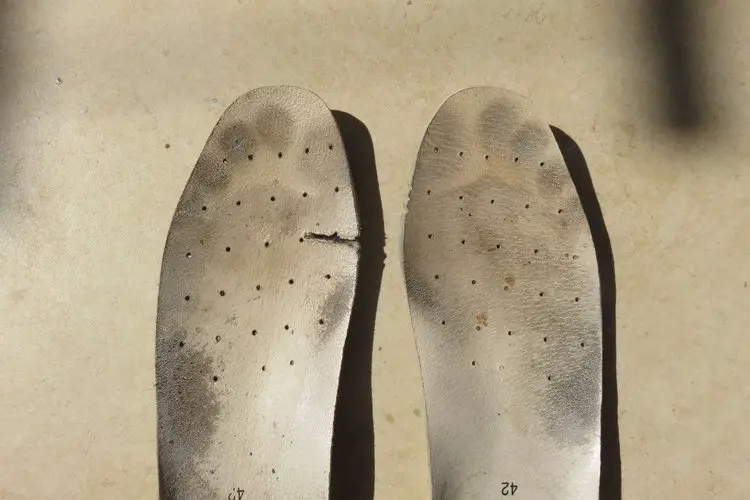
How to prevent stinking boots from bad insoles
- Adjustable Size: the replacement insole can support most size, trim to fit insole allows for a...
- Shock Absorption: The elastic rubber insole with unique honeycomb is designed specifically to fully...
- Brethable Fabric: The honeycomb shape shoe insole have good air permeability. The fabric on the...
Last update on 2023-11-11 / Affiliate links / Images from Amazon Product Advertising API
Change your insoles the moment you discover that they are worn out or the moment they start to stink—whichever comes first. Also, make sure you take out your insoles from your hiking boots and dry them separately after every hike.
When you make it a habit to dry your insoles separately, you will easily detect any fault on them that will potentially lead to stinking. Also, the insoles will dry faster when they are outside the boots.
Remember, it is easier to prevent your hiking boots from developing a stink than trying to eliminate the stink.
5. Overuse
If you are addicted to hiking, make sure you have more than one pair of hiking boots. Due to the often high cost of hiking boots, many hikers may try to maximize just a pair. However, that is a bad idea.
Firstly, it will cause the hiking boots to wear out faster. Secondly, it makes it harder for the boots to dry properly before the next use.
The accumulation of fungi and bacteria and moisture of sweat will lead to the explosion of putridity. While in other cases, the smell of the boots starts gradually, in this case it will happen suddenly to your amazement.
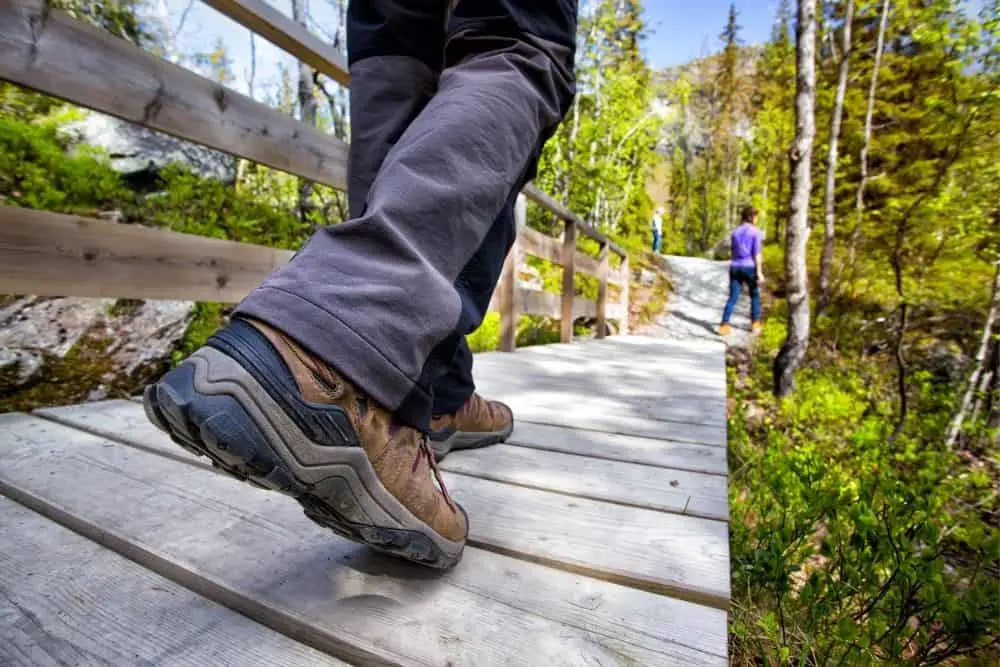
How to prevent stinking boots caused by overuse
If you will be hiking for more than a day in wet terrain, make sure that you do not wear one pair of hiking boots for two days in a row.
Always have an alternative which you will wear in an alternating manner. The over twenty-four-hour breaks between wears give the boots enough space to dry completely from either sweat or washing.
After a 5-day hike in Smoky Mountain and you don’t have a chance to take your hiking boots off, it will be very difficult for you to get all the odors out of your boots. You may then need Shoe Deodorizer Spray.
- POWERFUL SHOE DEODORIZER: Keep your shoes smelling fresh and minty clean with our natural foot and...
- DOUBLES AS FOOT SPRAY: Our shoe spray deodorizer can also be used as a foot deodorant, providing a...
- EASY TO USE: Simply spray directly onto your shoes or feet for instant odor elimination. The formula...
Last update on 2023-11-11 / Affiliate links / Images from Amazon Product Advertising API
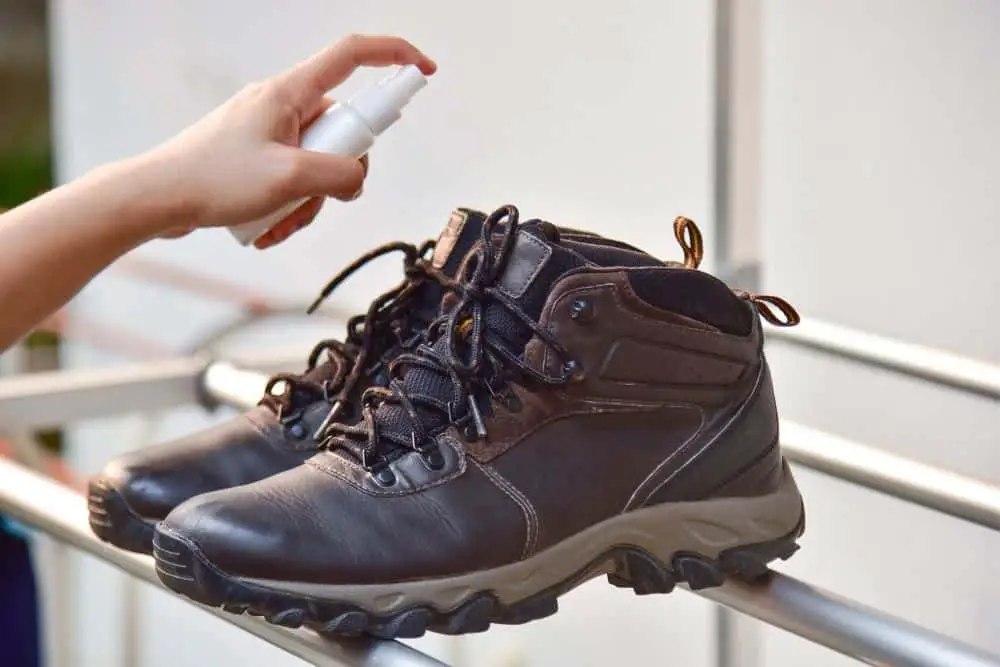
6. Poor hygiene
Sometimes, your hiking boot stinks not because of sweat or humidity but rather because of poor hygiene. Let’s face it, when was the last time you treated your feet to a pedicure? The truth is that many people don’t.
Thus, many people develop cracked or rough spots on their feet which becomes a good environment for odor-causing bacteria to thrive.
Others have long unkempt toenails that trap dirt, odor-causing fungi, and bacteria when they walk on bare feet. Eventually, this dirt and microorganisms get transferred to their boots and cause a stink.
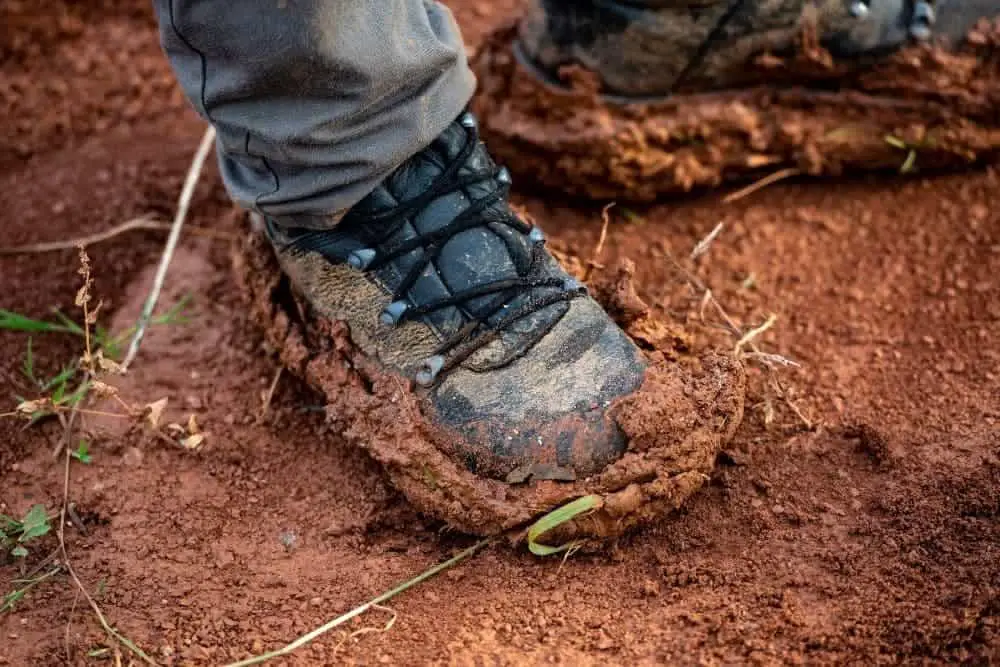
How to prevent boot stink from poor hygiene
Improving foot hygiene can lower the chances of having stinking boots. Taking care of your feet will help get rid of the odor-causing bacteria and fungi.
Applying foot lotion or petroleum jelly and wearing clean socks before going to bed can help get rid of rough or cracking feet if it is a persistent problem. The socks will lock in moisture that keep your feet hydrated to remedy the cracks.
Make it a priority to wash your feet with antibacterial soap. Use a soft brush or washcloth to get between the toes and clean them properly. Finally, keep your toenails trimmed at all times and file out every callus.
Make sure that you do not wear your boots immediately after washing your feet. Allow your feet to dry completely before inserting them into your boots.
7. Wrong Boot Choice
According to a 2018 research study published in the Journal of foot and Ankle Research, up to 72% of people wear wrong-fitting shoes. The downsides to this practice are enormous including foot pain and deformities, ingrown toenails, and decreased quality of life.
The discomfort caused by wearing the wrong shoe size can also increase feet sweat, reduced mobility, and falls—which can further get your shoes dirty.
Wrong boot choice can also occur in terms of material. Some boots are made of breathable mesh or Nubuck materials and are suitable for hiking in hot regions like Joshua Tree.
Others come with insulators and are perfect for hiking in colder terrains. You need to know when to choose either of them.

How to Prevent Boot Stink From Wrong Boot Choice
Study the location you intend to hike to know the prevailing temperature at the time of your hike. Pay close attention to weather forecasts. If the weather is sunny and hot, make sure you choose a hiking boot made of breathable material.
Mesh, Nubuck or suede allows better air circulation which cools your feet and keeps them dry. The less you sweat, the smaller the chances that you will end up with stinking boots.
How do you Kill Bacteria in Boots?
Since bacteria and fungi are the main culprits of smelling boots, it will be a smart idea to kill them from time to time before they blossom and cause the stink.
There is a popular saying that the best form of defense is to attack. In other words, occasionally attacking the bacteria and fungi keeps their population low so that they don’t build up to the point of causing a stink.
Some of the ways of eliminating bacteria and fungi include;
- Clean your boot with water and vinegar solution: Never use bar soap or detergents to clean leather boots because they may contain additives that may eat into the leather. Instead, use a mixture of eighty percent water and twenty percent vinegar to get rid of mold from your boots.
- Keeping your boot in the freezer overnight: odor-causing bacteria thrive at room temperature. At lower temperatures, their cell activities are paused which controls the odor.
- Stuffing your boot with cloves wrapped in pieces of paper or soft clothes: cloves have been shown to possess antimicrobial properties. This means that it can stop the growth of bacteria.
- Use foot powder: If your feet sweat a lot, apply foot powder on them before wearing your boots. This will help to keep them dry throughout your hiking duration thereby lowering the chances of having a smelly boot.
- Maximum sweat absorption
- All-day odor protection guaranteed
- Keeps feet & shoes fresh and dry
Last update on 2023-11-11 / Affiliate links / Images from Amazon Product Advertising API
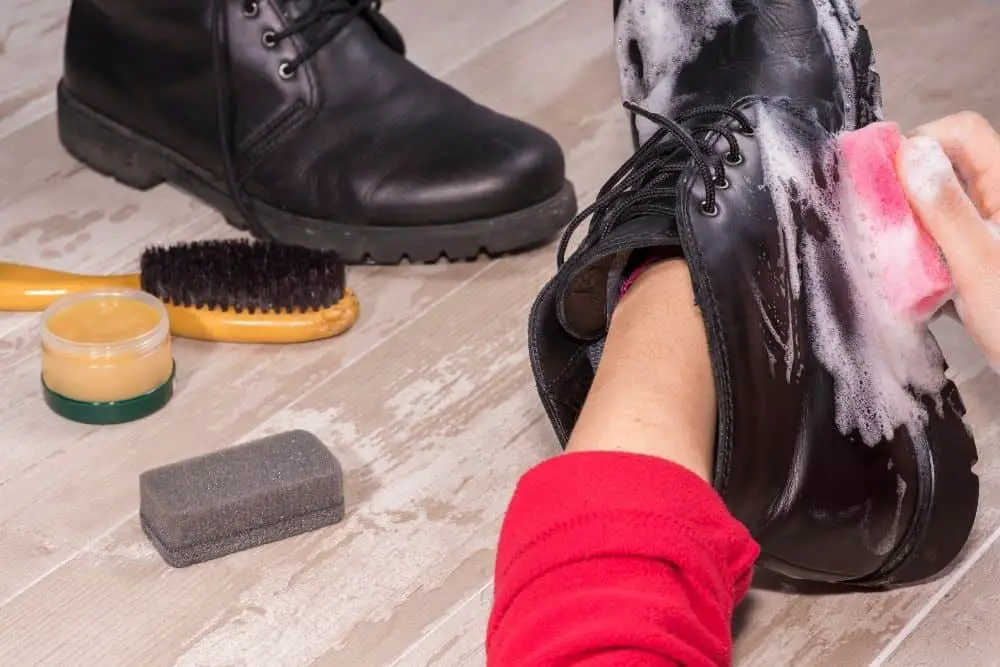
Conclusion
If you suffer persistent boot stinks with all your boots, perhaps, you need to get sweat-proof boots. These boots are well-perforated for proper ventilation. Proper air circulation in your boot will make it harder for your feet to sweat.
Also, the combination of good foot hygiene with moisture-wicking socks made of cotton or wool should lower your chances of developing boot stinks. You can also try moisture control socks.
Always remember to store your boots in a place with good ventilation and low humidity because odor-causing bacteria and fungi flourish in damp, dark places.




